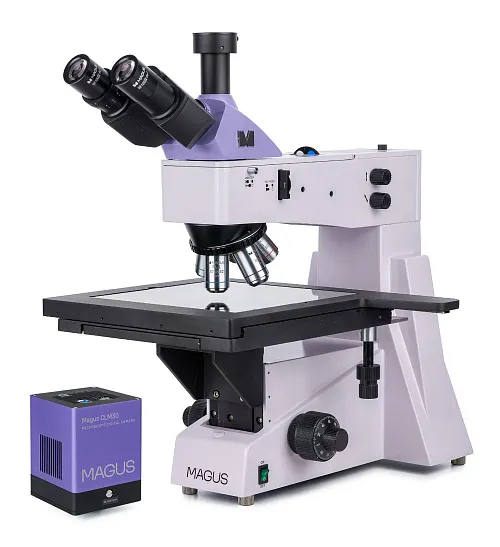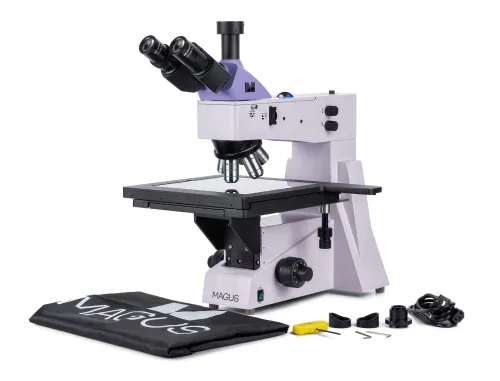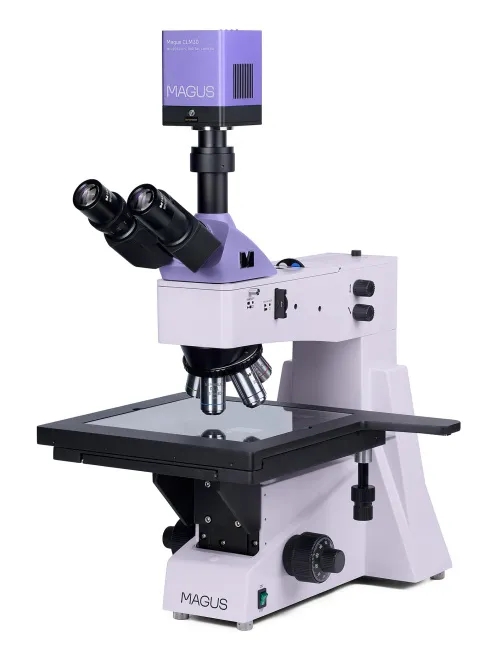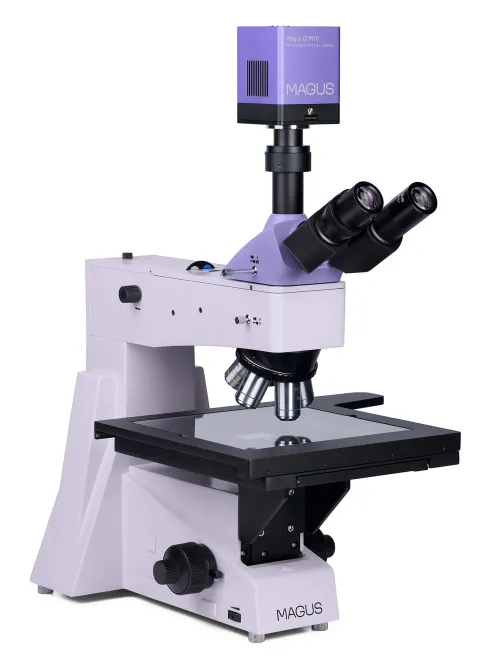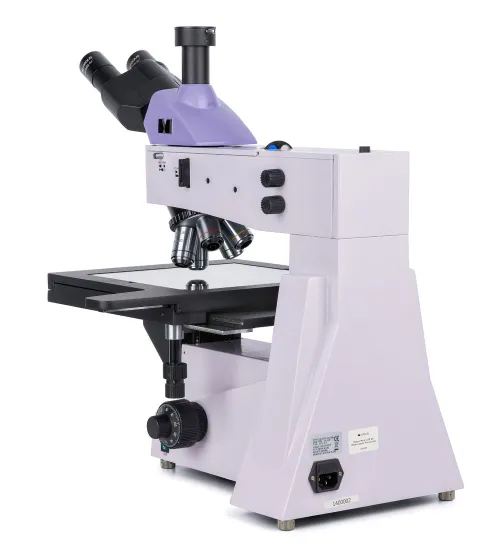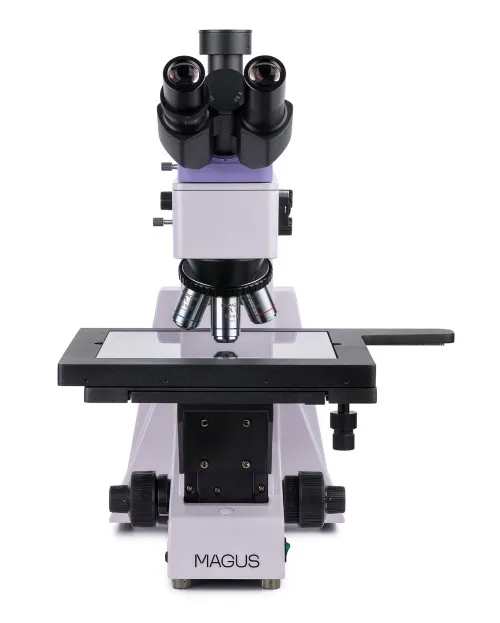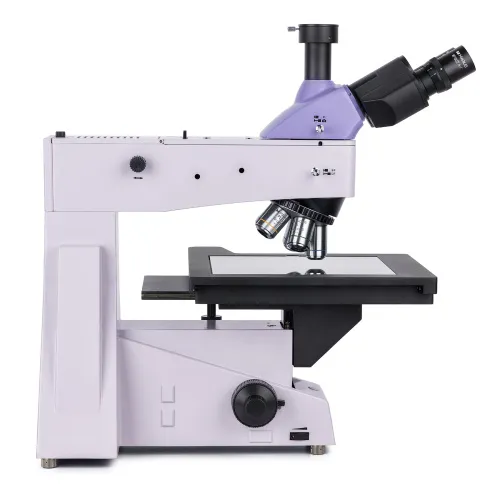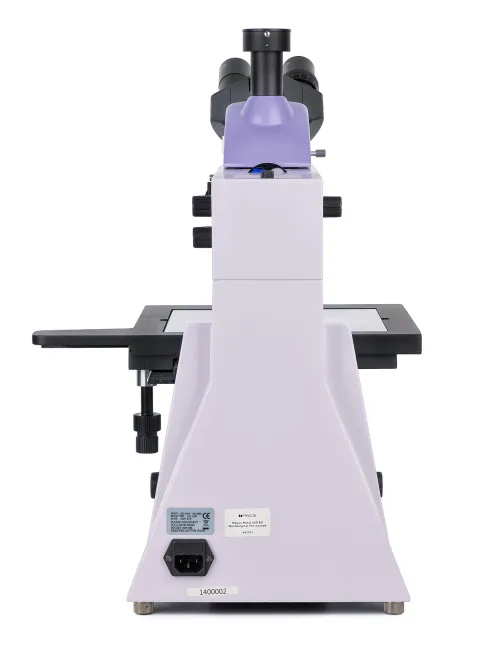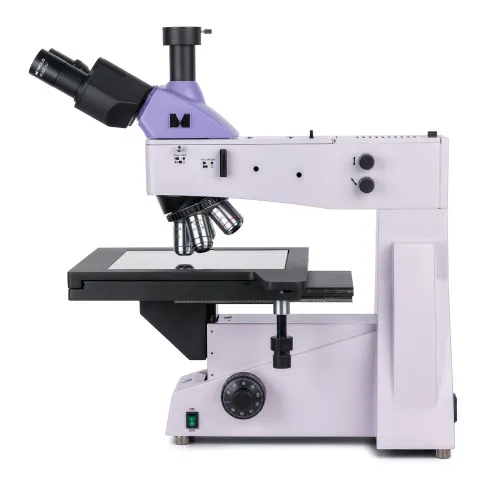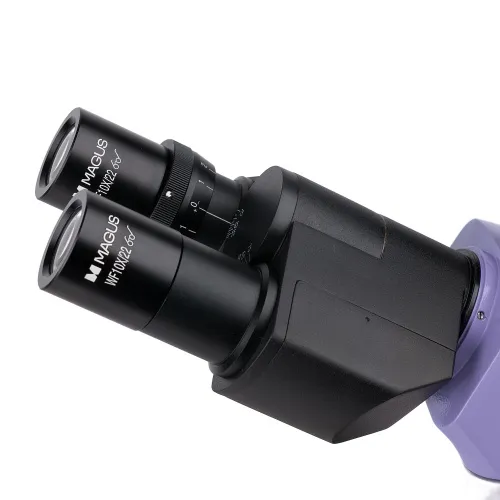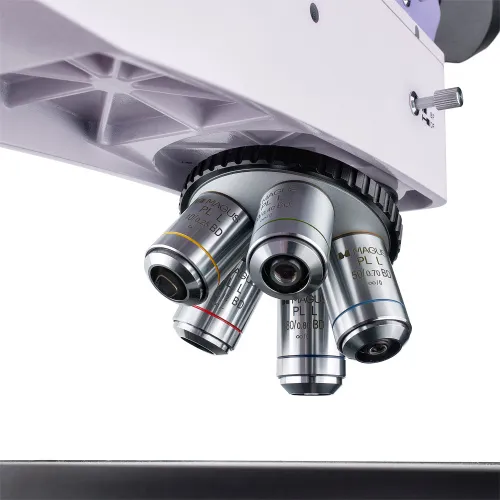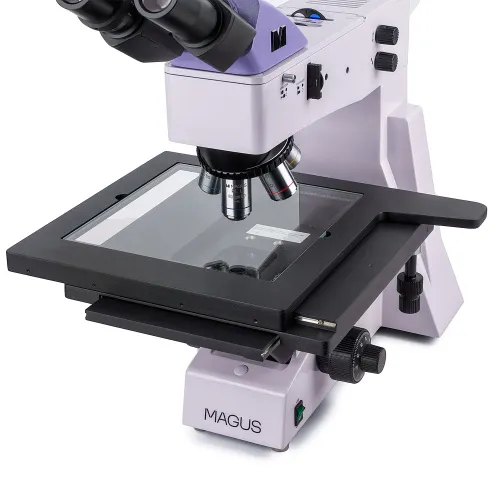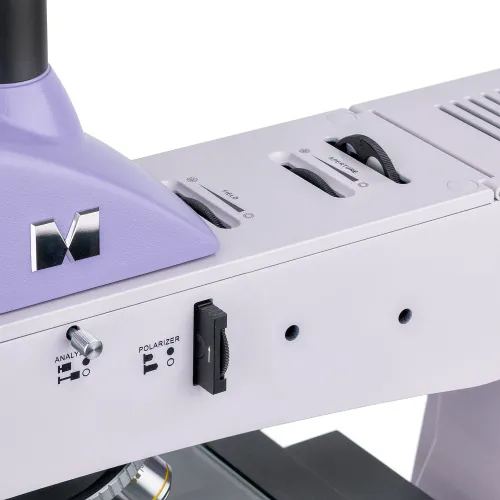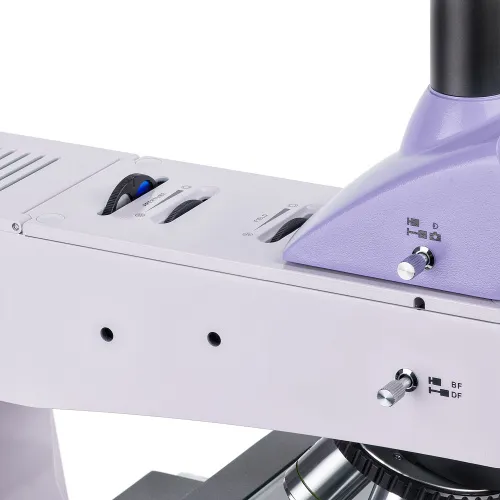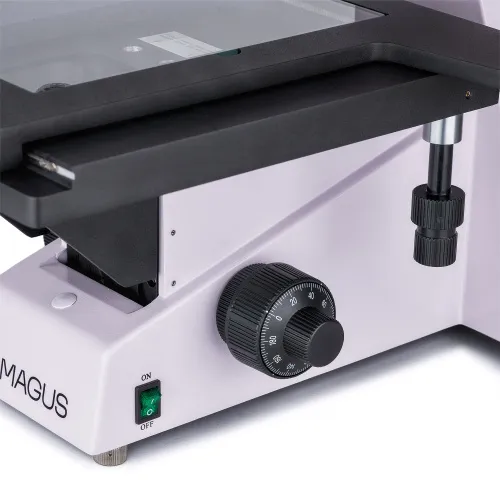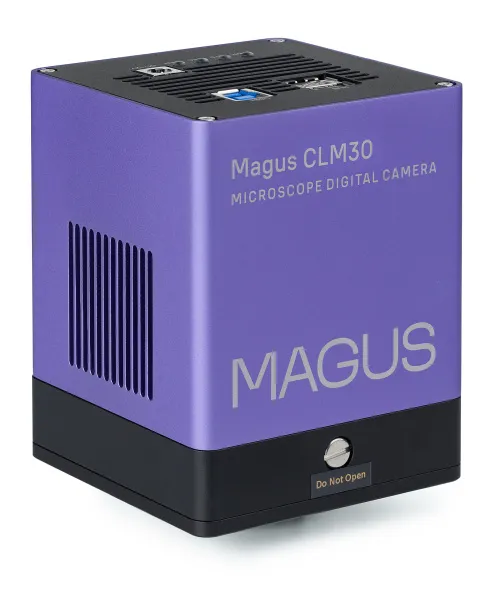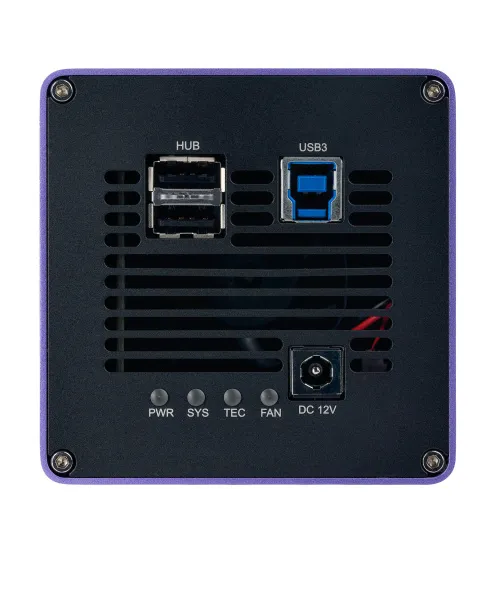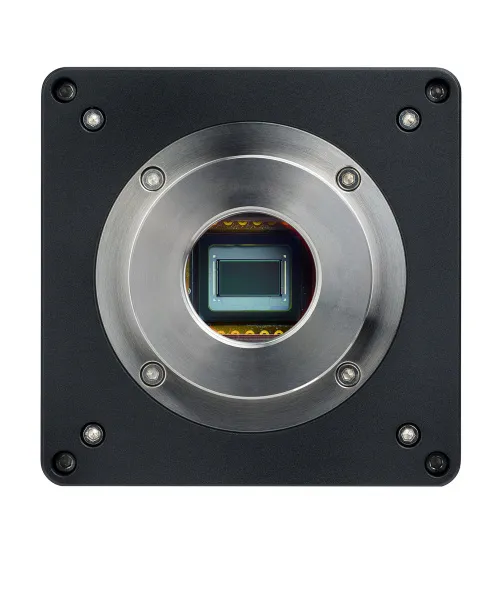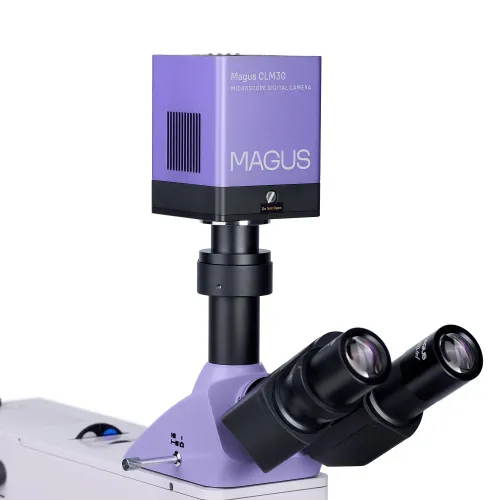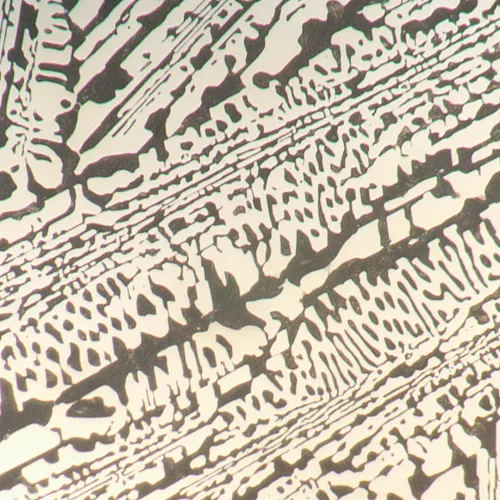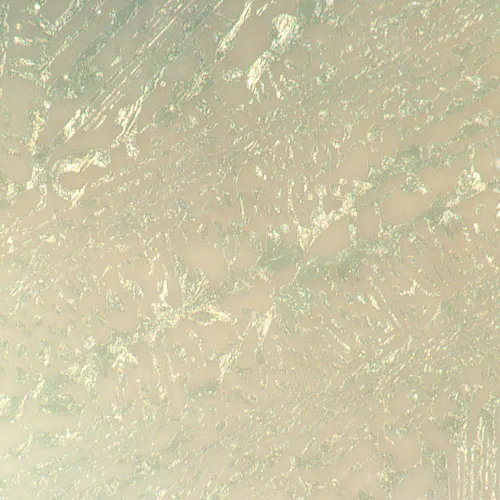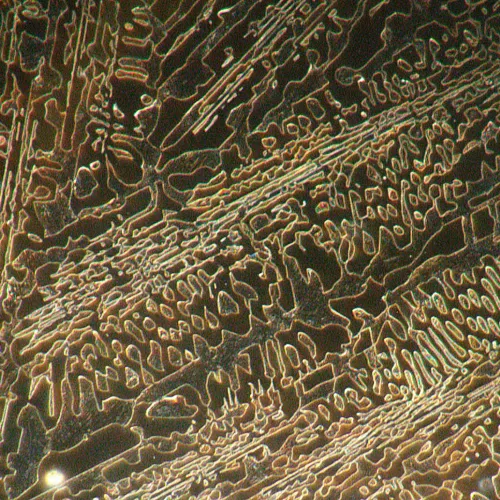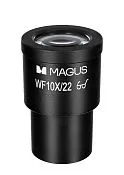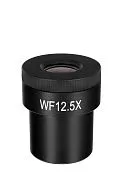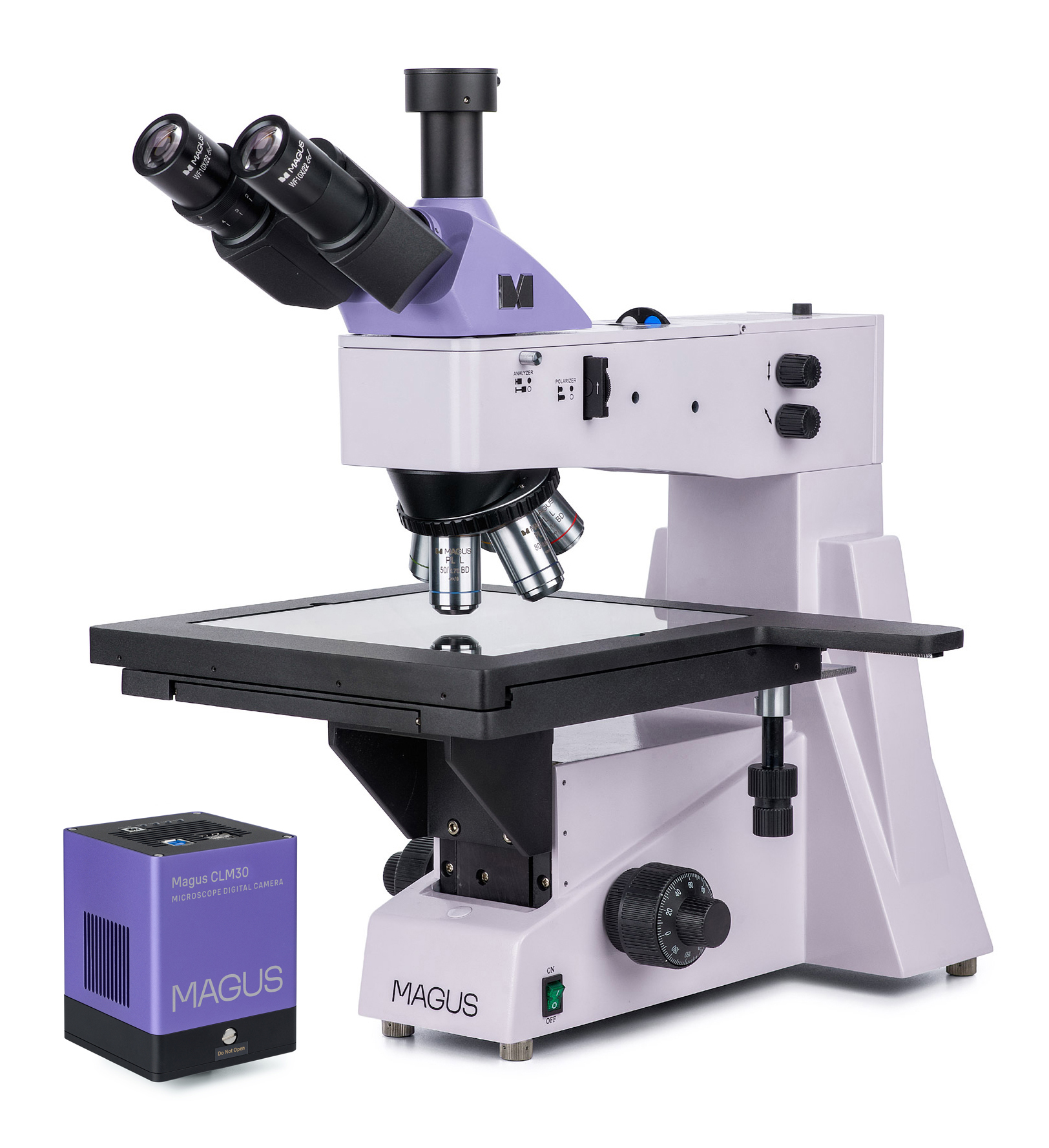MAGUS Metal D650 BD Metallurgical Digital Microscope
With a camera. Magnification: 50–800х. Trinocular head, plan achromatic objectives for brightfield and darkfield observations, 50W halogen reflected light illuminator, fine focusing in 0.7µm, large stage
| Product ID | 83034 |
| Brand | MAGUS |
| Warranty | 5 years |
| EAN | 5905555018423 |
| Package size (LxWxH) | 58x49x60 cm |
| Shipping Weight | 23.8 kg |
The MAGUS Metal D650 BD Metallurgical Digital Microscope is suitable for observing the surfaces of photomasks, integrated circuits, printed circuit boards, and other long and wide objects. It is equipped with a large stage that can easily hold large samples, and fine focusing with a scale value 0.7µm for high-precision observations at high magnification. Brightfield, darkfield, and polarized light microscopy techniques. The microscope is suitable for quality control laboratories, research centers, and university departments.
Digital Camera
The MAGUS CLM30 digital camera is designed for use in fluorescence and darkfield microscopy techniques.
The camera is equipped with an 8.3MP sensor and produces realistic images at a resolution of 3840x2160px. The camera is recommended for use with 4x, 10x, 20x, and 40x objectives. When working with low magnification objectives, the camera will allow you to see finer details.
Video is recorded at 45fps or 70fps depending on its resolution: They are smooth with soft and subtle transitions between frames. The movement of the sample is displayed in real time with no delays. The camera makes it easy to work with objects that are moving and is suitable for classroom demonstrations.
The camera is equipped with a USB3.0 interface. The data transfer speed is 10 times faster than USB2.0 cameras. The high-speed camera is recommended for professional laboratories, research, or university training.
Optics
The trinocular head has a trinocular tube for mounting a digital camera. The light/camera selection knob directs the light beam onto the camera for bright well-detailed photos and video that can be displayed on the external screen. The camera is not included in the basic configuration. On the left eyepiece, there is a diopter ring for adjusting the image.
Plan achromatic objectives with the BD symbol are designed specifically for brightfield and darkfield microscopy techniques. The objectives have a long working distance. Five of them are included, one in each slot of the revolving nosepiece. Any installed objective can be quickly replaced with an optional one, if required. Infinity-corrected optics with magnification from 50x to 800x. The revolving nosepiece with objectives is oriented toward the interior – the user can see the objective inserted into the optical path.
Illumination
The reflected light illumination system is designed for all observations to be as well-detailed as possible regardless of the used objective and microscopy techniques. The light source is a 50W halogen bulb that creates bright, even, and warm lighting. The Köhler illumination method can be used to adjust the illumination, there are filters for color rendering, and a polarization device (built-in analyzer and removable polarizer). The light source, aperture, and field diaphragms can be centered. The illumination system also includes a darkfield device.
Stage and focusing mechanism
A special feature of the microscope is a large stage of 280x270mm, with a movement range of 204mm along the X and Y axes. Focusing is adjusted by rotating the coarse and fine focusing knobs. They run smoothly and confidently, and due to the fine focusing scale value, operation at high magnifications is precise. The coarse focusing has a lock knob and tension adjustment. The focusing knobs are located at the base of the microscope, and so you can take a relaxed and comfortable position. You can place your hands on the table instead of holding them in the air.
Accessories
To get the maximum out of the MAGUS Metal 650 BD microscope, get additional accessories: eyepieces, objectives with long working distance for brightfield and darkfield, calibration slides, digital cameras.
Key features of the microscope:
- Precise focusing: fine focusing scale value 0.7µm; coarse focusing has a lock knob and tension adjustment
- Large stage for easy observation of long and wide objects, large range of movement of the stage along two axes
- Plan achromatic optics, trinocular head with a 100:0 and 0:100 beam splitter, trinocular tube for camera installation
- Light source, field and aperture diaphragms can be centered, Köhler illumination adjustment, polarization device, set of color filters, darkfield microscopy techniques
- Illuminator – 50W halogen bulb with 220V power supply and brightness-adjustment
- Optional accessories
Key features of the camera:
- For fluorescence and darkfield microscopy with 4x, 10x, 20x, and 40x objectives
- 8.3MP resolution: When observing with low magnification objectives, the camera will allow you to see finer details
- 45fps and 70fps at 3840x2160px and 1920x1080px resolutions for observing moving samples, recording video, and moving the preparation without jerks and delays
- Peltier element reduces the sensor temperature during prolonged operation and eliminates thermal noise. Therefore, long shutter speeds can be used when taking photos
- SONY Exmor color CMOS backlit sensor provides a low noise level and high light sensitivity even in low-light conditions. You will get clearer, brighter, and more color-saturated images
- USB3.0 interface for fast, smooth data transfer
- Software with photo, video recording, editing, external display functions, linear and angular measurements
The kit includes:
- The MAGUS CLM30 digital camera (digital camera, USB cable, 12V, 3A adapter, case, Installation CD with drivers and software, user manual and warranty card)
- Base with a power input, reflected light illuminator, focusing mechanism, stage, and revolving nosepiece
- Trinocular head
- Infinity plan achromatic objective: PL L5x/0.12 BD WD 9.7mm
- Infinity plan achromatic objective: PL L10x/0.25 BD WD 9.3mm
- Infinity plan achromatic objective: PL L20x/0.40 BD WD 7.2mm
- Infinity plan achromatic objective: PL L50х/0.70 BD WD 2.5mm
- Infinity plan achromatic objective: PL L80x/0.80 BD WD 0.8mm
- Eyepiece 10x/22mm with long eye relief (2 pcs.)
- C-mount adapter 1x
- Hex key wrench
- AC power cord
- Dust cover
- User manual and warranty card
Available on request:
- 10x/22mm eyepiece with a scale
- 12.5x/14mm eyepiece (2 pcs.)
- 15x/15mm eyepiece (2 pcs.)
- 20x/12mm eyepiece (2 pcs.)
- 25x/9mm eyepiece (2 pcs.)
- Infinity plan achromatic objective: PL L40x/0.60 BD WD 3.0mm
- Infinity plan achromatic objective: PL L60x/0.70 BD WD 1.9mm
- Infinity plan achromatic objective: PL L100х/0.85 (dry) BD WD 0.4mm
- Calibration slide
| Product ID | 83034 |
| Brand | MAGUS |
| Warranty | 5 years |
| EAN | 5905555018423 |
| Package size (LxWxH) | 58x49x60 cm |
| Shipping Weight | 23.8 kg |
| Camera specifications | |
| Type | light/optical, metallurgical |
| Microscope head type | trinocular |
| Head | Siedentopf |
| Head inclination angle | 30 ° |
| Magnification, x | 50 — 800 |
| Magnification, x (optional) | 50–1000/1250/1500/2000/2500 |
| Eyepiece tube diameter, mm | 30 |
| Eyepieces | 10х/22mm, eye relief: 10mm (*optional: 10x/22mm with scale, 12.5x/14; 15x/15; 20x/12; 25x/9) |
| Objectives | infinity plan achromatic: PL L5x/0.12 BD, PL L10x/0.25 BD, PL L20x/0.40 BD, PL L50x/0.70 BD, PL L80x/0.80 BD; parfocal distance 45mm (*option: PL L40x/0.60 BD, PL L60x/0.70 BD, PL L100x/0.85 BD (dry)) |
| Revolving nosepiece | for 5 objectives |
| Working distance, mm | 9.7 (5x); 9.3 (10x); 7.2 (20x); 3.0 (40x); 2.5 (50x); 1.9 (60x); 0.80 (80x); 0.40 (100x) |
| Interpupillary distance, mm | 48 — 75 |
| Stage, mm | 280x270 |
| Stage moving range, mm | 204/204 |
| Stage features | two-axis mechanical |
| Eyepiece diopter adjustment, diopters | ±5 (on the left tube) |
| Diaphragm | built-in aperture and field |
| Focus | coaxial, coarse focusing (30mm, 13.1mm/circle, with a lock knob and tension adjusting knob) and fine focusing (0.0007mm) |
| Body | CNC aluminum alloy |
| Illumination | halogen |
| Brightness adjustment | ✓ |
| Power supply | 220±22V, 50Hz, AC network |
| Light source type | 12V/50W |
| Light filters | green, blue, yellow, matt |
| Operating temperature range, °C | 5...+35 |
| Additional | built-in analyzer and removable polarizer, darkfield device |
| User level | experienced users, professionals |
| Assembly and installation difficulty level | complicated |
| Application | metallurgical |
| Illumination location | upper |
| Research method | bright field, dark field, polarization |
| Pouch/case/bag in set | dust cover |
| Sensor | SONY Exmor CMOS |
| Color/monochrome | color |
| Megapixels | 8.3 |
| Maximum resolution, pix | 3840x2160 |
| Sensor size | 1/1.2'' (11.14x6.26mm) |
| Pixel size, μm | 2.9x2.9 |
| Two-stage thermoelectric module (Peltier element) to set the temperature 42°C below room temperature | ✓ |
| Light sensitivity | 5970mV with 1/30s |
| Signal/noise ratio | 0.15mV at 1/30s |
| Exposure time | 0.1ms–1h |
| Video recording | ✓ |
| Frame rate, fps at resolution | 45@3840x2160, 70@1920x1080 |
| ADC digit capacity (bit) | 8/12 (selectable) |
| Place of installation | trinocular tube |
| Image format | *.jpg, *.bmp, *.png, *.tif |
| Video format | output: *.wmv, *.avi, *.h264 (Windows 8 and later), *h265 (Windows 10 and later) |
| Spectral range, nm | 380–650 (built-in IR filter) |
| Shutter type | ERS (electronic rolling shutter) |
| White balance | automatic, manual |
| Exposure control | automatic, manual |
| Software features | brightness, exposure time, image size |
| Software | MAGUS View |
| Output | 5Gb/s, USB 3.0 |
| System requirements | Windows 8/10/11 (32bit and 64bit), Mac OS X, Linux, up to 2.8GHz Intel Core 2 or higher, minimum 2GB RAM, USB 3.0 port, CD-ROM, 17" or larger display |
| Mount type | C-mount |
| Camera power supply | DC, 5V, from computer USB port; a 12V, 3A adapter for Peltier element |
| Camera operating temperature range, °С | -10...+50 |
| Operating humidity range, % | 30 — 80 |
and downloads
We have gathered answers to the most frequently asked questions to help you sort things out
Find out why studying eyes under a microscope is entertaining; how insects’ and arachnids’ eyes differ and what the best way is to observe such an interesting specimen
Read this review to learn how to observe human hair, what different hair looks like under a microscope and what magnification is required for observations
Learn what a numerical aperture is and how to choose a suitable objective lens for your microscope here
Learn what a spider looks like under microscope, when the best time is to take photos of it, how to study it properly at magnification and more interesting facts about observing insects and arachnids
This review for beginner explorers of the micro world introduces you to the optical, illuminating and mechanical parts of a microscope and their functions
Short article about Paramecium caudatum - a microorganism that is interesting to observe through any microscope

